Civilization players have long been familiar with “one more turn.” The phrase acclaims the fact that the 4X franchise from Sid Meier and Firaxis keeps you clicking again and again until you reach your end goal. Gathering Storm, the latest expansion for Civilization VI, attempts to keep that engagement alive and well. With new leaders, the returning Diplomatic Victory, and even climate change as fixtures, there are more ways for you to enjoy and explore.
Unfortunately, most of these mechanics happen on the side, barely affecting your core game outside of a few instances. If Gathering Storm’s focus is on “climate change,” then its features are mere “spare change” compared to what you’ve been doing these past couple of years.
Note: My playthroughs were for:
- Immortal difficulty
- Ancient Era start
- Continents – Huge
- Standard speed
- Five AI civs
Civilization VI: Gathering Storm – New Expansion, New Leaders
Before we get to the unsatisfactory parts, let’s look at the good stuff first — the new leaders in Civilization VI: Gathering Storm. Firaxis did exceptional work when creating these new civs and leaders. Their unique mechanics — which I’ve outlined in a preliminary tier list — make for varied styles of play.
Mansa Musa, the leader of Mali, can generate a ton of gold, but he’ll have a hard time at the game’s start due to focusing on desert tiles. Maori’s Kupe starts at the ocean, and you’ll need to preserve nature to succeed. Eleanor of Aquitaine (who can lead both England and France) happily flips city loyalties with Great Works, much to the chagrin of the Ottoman Empire’s Suleiman the Magnificent (whose fuels his conquests with engines of war). Mattias Corvinus of Hungary relies on mercenaries, while Phoenicia’s legendary Dido expands from the coast. Pachacuti of the Inca defends the mountains, and Canada is Canada.
And then there’s Queen Kristina of Sweden who completely blows all of them out of the water. Kristina’s abilities allow her to gain extra Great People. Likewise, she can start the Nobel Prize competition, one where she’d often have an edge. Of course, this also lets her accrue more Diplomatic Favor, a brand new resource that leads to a Diplomatic Victory (more on this later).
War! What Is It Good For?
With the new Diplomatic Victory condition and the Grievances mechanic, war tends to mean absolutely nothing. The more aggressive the AI is, the more Grievances you’d have against them. You can then “cash in” these Grievances to denounce or use different types of casus belli for war.
Naturally, the AI can do the same to you if you’re a jerk. AI civs who are watching on the sidelines will also think negatively of you as an aggressor, thereby acquiring more grievances.
The mechanic penalizes expansionist playstyles given that warmongering AI will still look negatively upon you if you’re capturing cities left and right. Looks like imperialism is only acceptable for the person doing it and not for others. Assuming you’re not threatening the AI often, then you’re looking at a smooth playthrough until the very end even on Immortal difficulty.
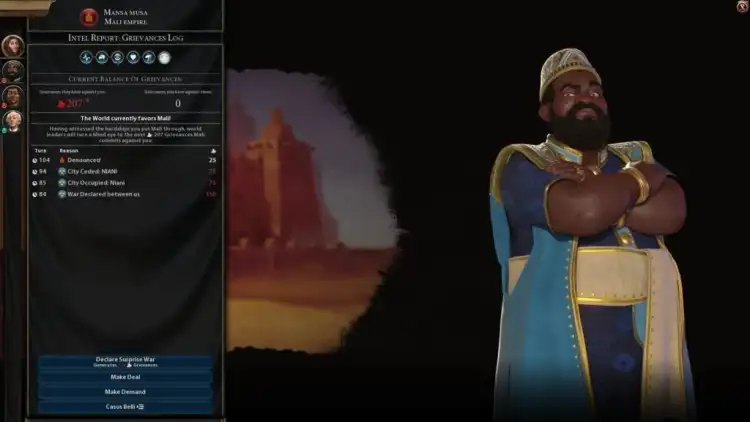
The Grievances panel shows why a civ might hate you. Because it’s civ AI, they’ll hate you for just about anything except when you’re a docile lamb.
Can You Do Me A Favor?
A new resource known as “Diplomatic Favor” is accrued from being a city-state sovereign as well as alliances. These are, like Grievances, points that you can “cash in” when the World Congress convenes at the start of the Medieval Age. Every 30 turns, you can make a proposal, from banning certain city-state bonuses to doubling the cost of certain units. You then dump as many points as you want for “choice A” or “choice B.” The AI will do the same based on what it wants to achieve.
Since Diplomatic Favor is a tradable resource, you’re going to get pop-up proposals from other leaders using that as a bargaining tool. If they’ve annoyed you before with nonsensical offers, then prepare to see more of those.

In typical Civ AI fashion, they’ll still make weird trade proposals. Sometimes, though, it could work in your favor when you remove an item and ask what could make the deal work.
The mechanic looks intriguing on paper until you realize that it’s poorly implemented. For one thing, you can’t select the next set of proposals that would be available for the upcoming convention. You also can’t coerce the AI into voting for certain proposals you want — a tooltip will say that an AI might like a proposal, but it won’t tell you how much Diplomatic Favor they’ll spend. You’re even free to ignore this mechanic completely especially if the AI ends up using its own points for something that you’d prefer.
Apart from these, the Diplomatic Victory itself is the hardest one to attain. It’s not because of the actual difficulty, though; it’s because of the sheer length of time it takes to even get there.

After 100 turns of being best buds, Kupe felt aggrieved and decided to ally with Canada against me. He lost… because Canada.
One (Hundred) More Turns
After you’ve met all the civ leaders in your game, an extra proposal appears on the World Congress panel. This allows you to dump Diplomatic Favor to turn them into Diplomatic Points. Whoever uses the most favor (as votes) will get two Diplomatic Points — and you’ll need ten to earn a Diplomatic Victory. That’s five “rounds” for a total of 150 extra turns. You’re not even guaranteed to win each round since the AI will likely vote for itself to stymie your efforts.
There are, of course, other competitions and even emergencies added in the World Congress. Some of these may net you extra Diplomatic Points as well — such as offering aid to someone affected by a calamity. Ultimately, though, the Diplomatic Victory feels tacked on and unnecessary. In fact, the World Congress feature feels the same way.
Unlike in Civilization V, where the system was more straightforward and the AI reacted as you would expect — an ally in a war will likely prefer your proposals — the AI in Civilization VI makes asinine decisions at times. Imagine Mattias being at war with Suleiman, only for the former to vote for a proposal that gives extra trade routes to the latter. Given that we’re talking about diplomacy here, the mechanics and the AI lead to a “free-for-all” scenario as opposed to something you’re cooperatively working towards.

There’s a good chance that Sweden will come out on top in the World Congress. Actually, scratch that, Sweden will always win in the World Congress.
Heal The World
Speaking of features that they’ve tacked on, we’ve got weather and climate change. Disasters were once part of the franchise before disappearing in Civilization V. They’re back with a vengeance, but it’s the type of vengeance where it’s a kid tickling a grown man.
I’ve fiddled around with the Disaster Intensity setting at level two and three. Yes, they can and will happen randomly. Yes, they will devastate your cities. But, more often than not, you’re still chugging along with a builder ready to repair whatever tile got damaged. Some like tornados and storms might do moderate damage, while others like the Thousand-Year Flood will probably kill units near a river. Every disaster is manageable, and your playthrough would rarely if ever, be gravely affected. The only rule here is to never settle near an active volcano, that’s it.
Disasters, rightfully, are side attractions to the game. They only become a focal point when the Industrial Era starts and your factories start burning through resources. CO2 emissions start rising and different phases of climate change start to occur. Sea levels will rise and low-lying tiles will sink to the depths of the ocean. More storms and blizzards will form as the earth’s temperature heats up. That’s basically it. The world doesn’t crack open, the human race doesn’t get wiped out — it’s just an extra challenge, albeit one that’s underwhelming.
You can try to save Mother Earth by switching to renewable energy. Where once your strategic resources like coal and oil powered up your facilities, you can have wind turbines and geothermal plants instead. It’s a balancing act between unrivaled progress and conservation for future survival. I cannot fault Firaxis at all for adding this mechanic in Civilization VI: Gathering Storm given how it’s a timely discussion in society.
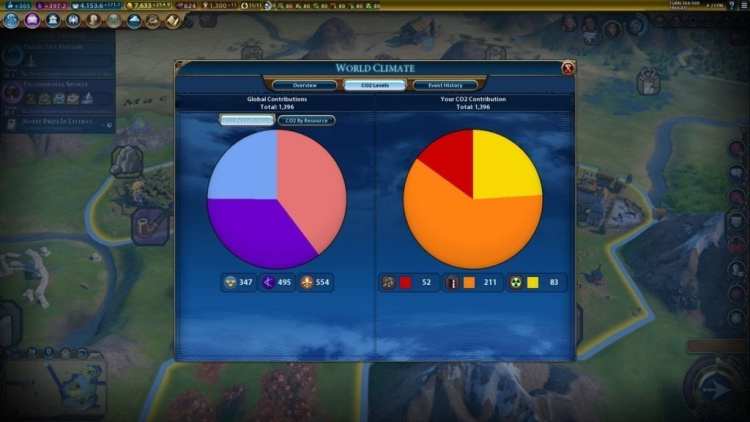
You can conveniently view the world’s climate, CO2 emissions, and even past weather events via a new panel.
Civilization VI: Gathering Storm – Findings and feedback
The only reason why I do feel it’s tacked on is that, like Diplomatic Victory conditions, all of it happens fairly late in a game. If you’re someone who, like me, focuses on a civ’s strengths and beelines for game-changing tech, civics, and wonders, then your goal is to win the game before the AI does (especially in higher difficulties).
That means that most games in Civilization VI: Gathering Storm are already decided before people even discover plastic. You’re probably on your way to victory and you’re just clicking for the hell of it, or the AI’s bound to win and you’re also just clicking for the hell of it. The latter phases of climate change — and the ways you can stave off its effects — are a non-factor in deciding who wins by that point.
Here are the results of my completed playthroughs in Civilization VI: Gathering Storm:
- Mali – Religious Victory
- Ottomans – Domination Victory
- Phoenicia – Domination Victory
- Sweden – Cultural Victory
- Sweden – Diplomatic Victory
- These don’t even count the failed runs when the AI snowballed and I couldn’t do anything about it.
Oh, and the only reason why I won a Diplomatic Victory as Sweden? I turned off all other victory conditions and skipped several turns so I could experience the rest of the features. Perhaps the best way to experience these mechanics is to just start from the Modern Era onwards.
That’s a darn shame, really. The Civilization franchise has always been known for having a weaker endgame experience, and Civilization VI: Gathering Storm is no exception. Most of the action happens in the early to mid-game stages of your playthrough. Anything that happens past turn 250 is just you cleaning up the mess — whether it’s an AI opponent that needs to get crushed by your Giant Death Robot, or the planet’s pollution.

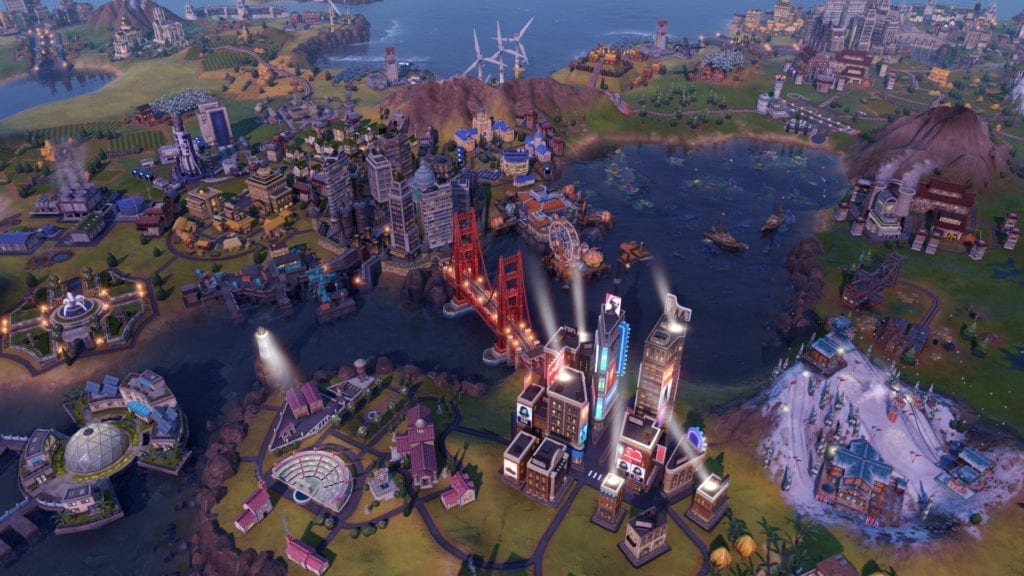
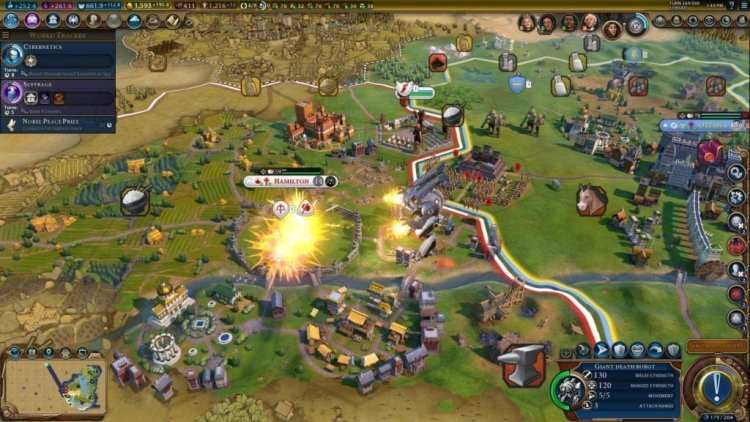
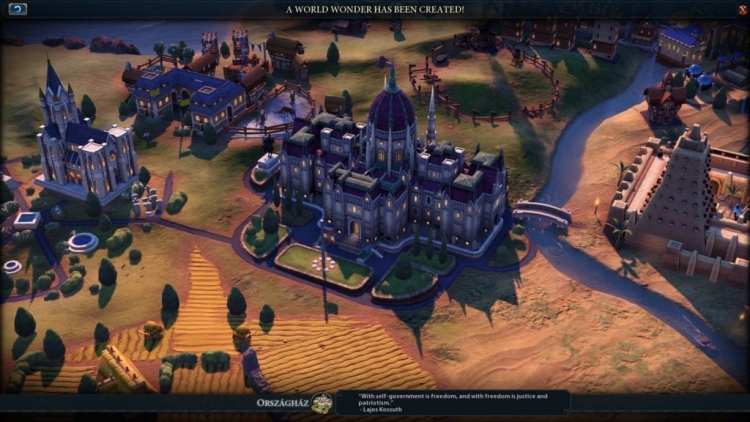
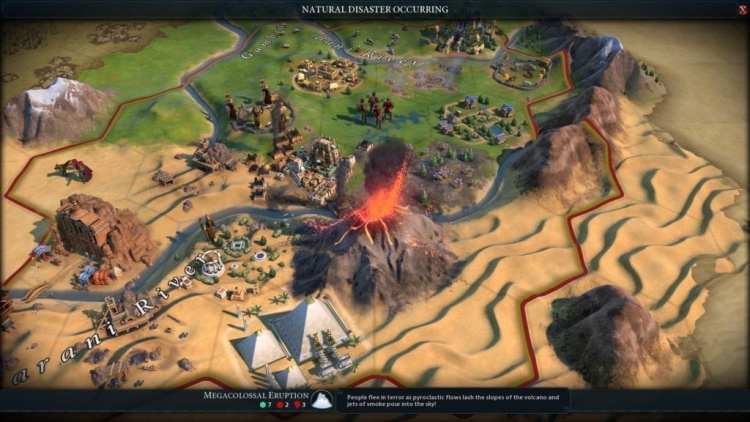





Published: Feb 12, 2019 12:35 pm